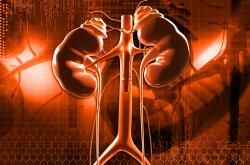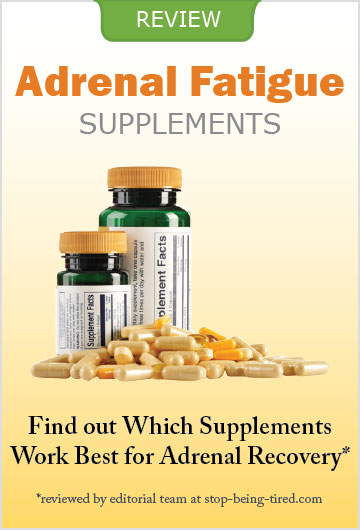Adrenal Fatigue
The adrenal glands (a small pair of walnut shaped organs sitting on top of the kidneys) are crucial for health and well-being, yet the stresses of modern life frequently deplete their energy. What are the causes and symptoms of adrenal fatigue and what can you do to help yourself?

The causes of adrenal fatigue
There are increasingly high levels of stress in the 21st century world. However, our physiology was not designed to cope with the duration and relentlessness of modern stress. For most of humankind’s history, our bodies were only put under stress because of physical circumstances e.g. the need to run away from a dangerous predator. It’s called the fight or flight response and, in such circumstances, the adrenal glands pump out adrenaline (sometimes called epinephrine), which has these effects:
- Directing blood towards the muscles (enabling us to run away from danger)
- Heart rate increases to give us more energy
- Reflexes become razor sharp as we scan our environment for information
- Directing blood away from internal organs (making them much harder to rupture in case of a fight or injury) and away from the digestive system.
Another way of looking at the role of adrenaline is to see it like the ‘overdrive’ button on a car. For a short while, you can go faster and push your body to its limits, but then you must return to a normal state of being and allow the adrenal glands to recover.
The problem with the present world is that the nature of the dangers we experience has changed. Instead of the short bursts of fear and extreme activity that a stone-age person would have faced, we now have more complex anxieties which often become chronic. These stressors are no longer physical (although they may have an element of survival in them, which triggers our fight or flight responses). They can include:
- Financial problems
- Employment uncertainties
- Time restraints and difficult deadlines to meet
- Divorce and separation
- Lawsuits and other ongoing issues the outcome of which is uncertain
[Please seeStress and Tirednessfor a complete list of life events which cause stress.]
It is also worth bearing in mind that when a person is under adrenal stress, any change, even a positive one, such a promotion, getting married or having a baby can cause yet more stress. Indeed many of us develop chronic stress, so we are never able to get the adrenal glands back into balance and they gradually become more and more exhausted.
The effects and symptoms of adrenal fatigue
The effects of adrenal fatigue are subtle over a period of time. As well as causing specific symptoms, the long-term effect of additional adrenaline is destructive. In fact, it’s one of the most powerful oxidizing substances known and the excess of this hormone causes injury to cells, collagen, DNA, enzymes and other important molecules. This causes the body to function less effectively and to be less successful at fighting off infection and also, possibly, to age faster.
One of the major indications of adrenal fatigue is extreme tiredness because the body now has to fight harder and harder to maintain itself. Here are some of the more specific effects:
- Chronic elevation of heart rate and creation of arterial spasm which can contribute to coronary heart disease.
- Decreased blood flow to vital organs leading to spasms of colon, bladder and bronchial tubes. As well as being painful, this means that the function of these organs is diminished.
- Immune system is compromised – more chance for opportunistic infections (e.g. EBV, HSVI, CMV and HSVII) as well as lowered resistance to cancer.
- Reproductive capacity is lowered because reproduction is less desirable in terms of survival at times of stress. Additionally, the hormones which control the sex drive are decreased, leading to a loss of libido.
- The production of aldosterone is increased, causing retention of sodium, water and calcium. This in turn, leads to depletion of magnesium and has a negative effect on other crucial physiological reactions. Low magnesium levels cause fatigue as well as spasm (e.g. vasospasm and bronchospasm, in turn contributing to hypertension and asthma). Iodine is also reduced by aldosterone which leads to low thyroid function and more fatigue. Other trace minerals are affected causing a variety of effects including unhealthy prostate function and poor insulin utilization.
- The elevated levels of cortisol (as a result of adrenaline) cause the storage of fat and the increased body weight, which also contributes to low energy.
As you can see, adrenal fatigue not only makes you tired, but can make you very sick as well.
What can you do to help with adrenal fatigue?
As you can see, adrenal exhaustion is a serious issue and recovering from it should be made a priority if you are suffering from fatigue. In addition to sleeping well [please seeImproving the quality of your sleep] you will need to ensure that you have the correct nutrition [please seeEating Well when you’re tiredandFood and drink to avoid if you are feeling tired].
There are also very positive things to do about the stress in your life. Some people are more naturally resilient to stress than others (often because of good nutrition in childhood) or because of other factors. If you are prone to stress, do not beat yourself up for not being ‘mentally tough enough’. Recognize that you have this vulnerability and find ways to mitigate the effects of stress in your life. Here are some suggestions…
Keep a stress diary
Find out what causes you to become stressed. One of the best ways is to keep a stress diary. Using a simple scale of 1 – 10 like the one below, keep a record of how you feel in difficult situations. Note the triggers, which make you stressed. Usually, noting things down by itself causes the situation to improve. The information that you gain about your triggers will enable you to avoid them in the future or find ways to manage them. Review the events and the degree of stress each trigger causes after a few days.
Trigger for this stress___________________________________________
Simplify life
If possible, simplify your life. Many of us collect possessions, which we don’t need, and work ourselves to the bone trying to keep up with loan payments. If you can make do with a little less, and enjoy better health as a result, you may find this is a good trade-off.
Cultivate wisdom
- Accept what you can’t change. Some things just can’t be changed. But the past (which is unalterable) doesn’t have to become the future, which is still flexible and open.
- Try to find the good in every situation. There is usually a ‘silver lining’ in everything that happens. It may involve learning an important lesson, or forgiving another person. In any case, you will feel more relaxed if you acknowledge the difficulties while looking for the good.
- Plan ahead for stressful events. When you know that stressful events are coming up, then it makes sense to nurture yourself and protect yourself even more, so that you will not be exhausted at such times.
- Spend time with positive people. If you are experiencing fatigue, spend less time with negative people, who tend to drain both physical and emotional energy.
- Resolve conflicts. Conflicts, whether internal or external, use up a lot of energy. Try to put events and misunderstandings, which you are conflicted about, in the past and seek out positive experiences, which will enhance your life. It’s amazing how easy it is to become habitually conflicted about things, and also amazing how easy it is to create positive patterns.
- Make sure you do something positive, fun or uplifting every day. It’s a good idea to do something you enjoy every day and plan fun events that you can look forward to.
- Practice time management – take a short course or read a book on the topic. It will help you to be less anxious about deadlines.
- Exercise is a great stress buster, but make sure that it isn’t too intense or prolonged as this will deplete your reserves of energy even more.
Practice relaxation
Relaxation lowers blood pressure, slows breathing rates and generally reduces the levels of stress hormones. There are many ways to relax. Here are some that you might like to try:
- Controlled breathing. Breathe gently in through your nose for a count of five, hold your breath for a count of two and then exhale for another count of five. Try to do this every day for ten minutes.
- Progressive relaxation. Working your way from your feet to the top of your head, progressively tense and relax each area of your body.
- Guided Imagery. Choose scenes that make you feel relaxed and peaceful, such as lying on the beach, walking in forests, or being in a garden. Use as many of your senses as possible, see, hear, feel, taste and smell the beauties of each scene.
[Please seeDealing with stress and fatiguefor MORE details on stress reduction techniques.]
Finally, bear in mind that recovery from adrenal exhaustion can be a long process. Don’t be disappointed when and if there are set-backs along the path. Each day you eat, sleep, relax and exercise well will build up your resilience to stress. Make sure that you acknowledge the improvements on a regular basis because this will stimulate more improvement. Feeling better is a sure indicator that you are getting better.















.jpg)




Leave a comment